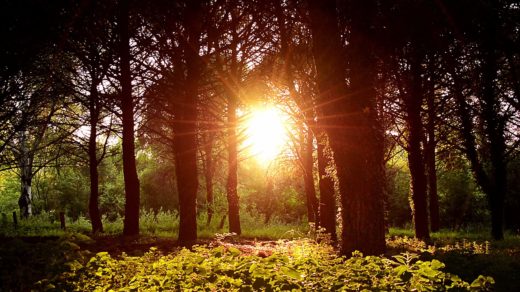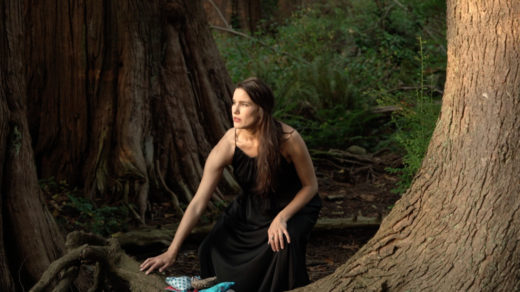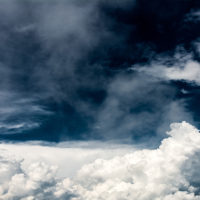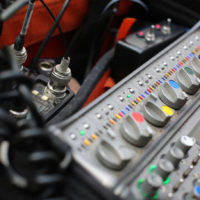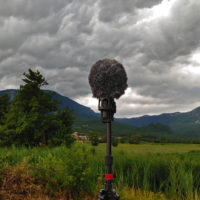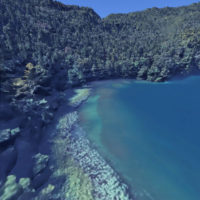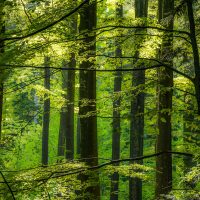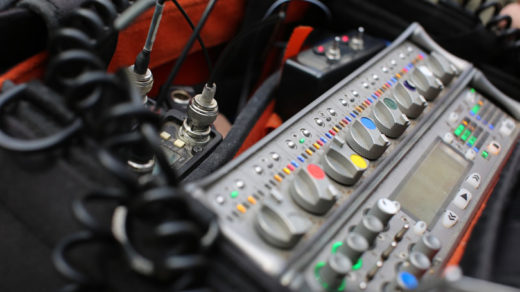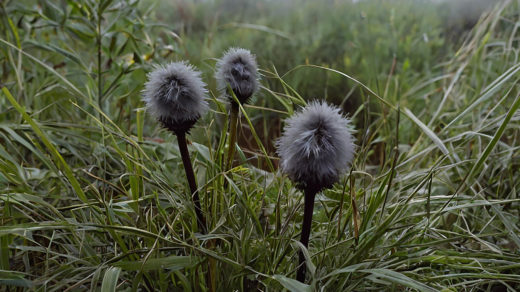Interview with Martina and Simon about Biodukt with Harley Brown, The Guardian, April 2020.
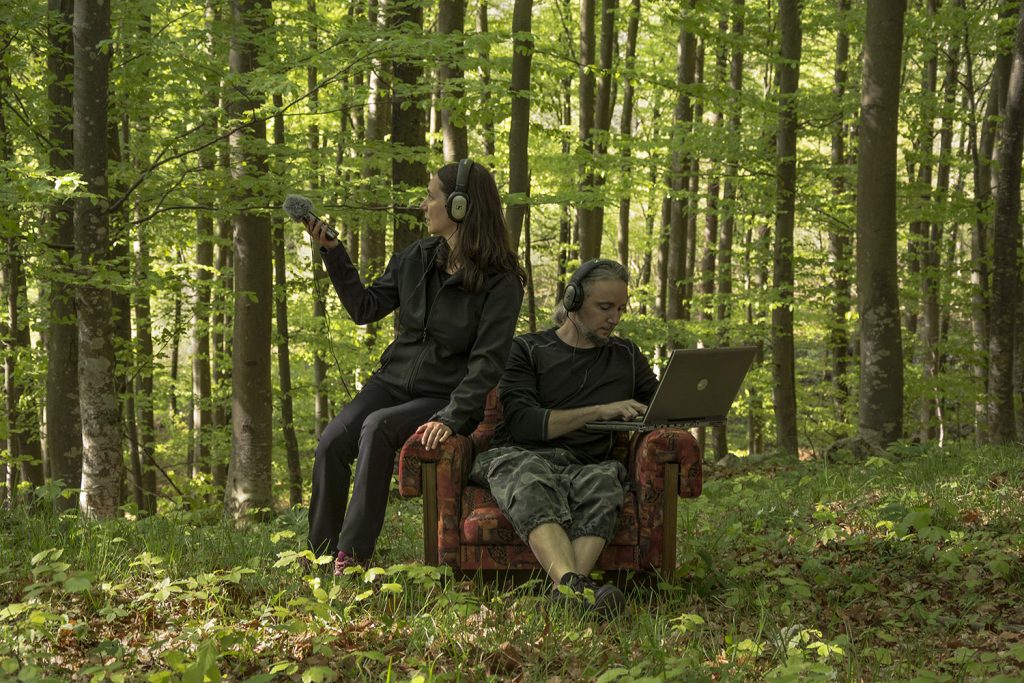
On the Bandcamp page for this release, it says that Biodukt was part of Martina’s thesis, “Analysis of the influence of the sound environment on customer behavior.” Can you tell me more about that?
Martina: At the Faculty of Economics I studied both finance and marketing. I wanted to write a thesis in marketing, but when I read other theses, I found out that they all focused on only one sense, sight. Furthermore, they all used just one assessment tool, survey questionnaires. Considering that I learned to play the piano as a child, that I enjoy music very much, that my son learns to play guitar, and that my partner Simon is a musician and sound designer, I decided to take a different route. The idea to use nature sounds emerged from the many years I spent outdoors. Simon and I have always enjoyed spending time in our natural home and always return full of energy and positive thoughts. As a result, I began taking note of studies on the effects of frequencies in the natural environment, which literally heal people.
My thesis is set out as a multidisciplinary tool in the hope that a variety of behaviours would begin to be more significantly connected than they currently are. In it I first present sound and music as physical parameters, then I describe the process of listening from a biological perspective, where the ear receptor transfers stimuli to the brain. This is why I am interested in the effects of sound on people, such as the physiological, psychological, cognitive and behavioural effects, as well as the psychological processes in action when hearing music and tendencies relating to the influence of sound. One of the key forces of the latter is the archetype. In addition to numerous studies, materials by Helga de la Motte-Haber, a German musicologist, and Clarissa Pinkola-Estés, a Jungian psychoanalyst, were most helpful.
In the scientific gathering of data and assessment, I chose to use an experiment. In doing so I based my work on Ronald E. Milliman’s study that showed a positive correlation between time spent shopping and the number of items bought. The study also showed that sound influences how much time we spent shopping, as sound affects our perception of time. The purpose of my experiment was to determine whether the type of sounds (independent variable) affects the behaviour of a consumer in the sense of the actual time spent visiting a sales space (dependent variable). The experiment, which was performed in a retail outlet, supermarket where a radio programme was used to create the sound environment and where I exchanged the radio for sounds from nature, such as wind, water and birdsongs. The results of the experiment confirmed that people, where exposed to a sound archetype, spent more time in the space it was played.
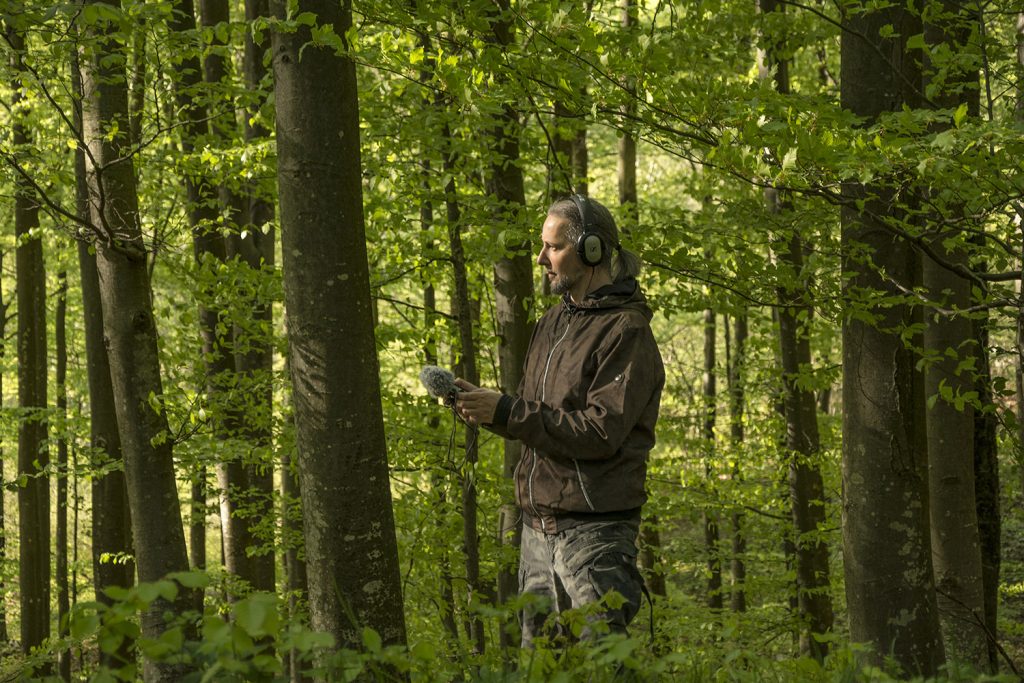
What was your recording process?
Simon: The concept of the album is the day’s rhythm, from morning to evening, condensed into exactly one hour. We recorded it over a longer period of time, in various woods, fields and wetlands, we chose a variety of recording locations, some in situ, others as a “drop rig”, where we are able to get the most authentic recordings in nature without human presence. In the end, we obtained tens of hours of recordings, which had to be listened through in the studio, catalogued, selected and edited, to create a meaningful and comprehensive, logically connected story. Some recordings are sculptured or collaged, while on the other hand, we retained the documentary value in the mostly unmodified recordings. We didn’t even use a lot of the material of woodland animals, for example the sounds of deer, owls, squirrels, mouflon and others, but we will definitely use them in our future projects. We spend a lot of time in the mountains and an essential piece of equipment that is always in our backpacks is a portable recorder and camera.
Please tell me more about the Italian and Slovenian forests in which Biodukt was recorded. Does the album have a conservational aspect to it?
Simon: The album begins in a sub-Alpine forest and continues straight across the map to the Adriatic Sea. It ends at the Italian natural reserve where the Alpine river Soča flows into the sea. We are lucky to be living in a place where we can reach both the Alpine mountains and the seashore within an hour. Slovenia is a country rich in forests, they are the main element of its landscape, as almost two-thirds of the country is covered in trees and, as such, is one of the most wooded countries in Europe. We can say with certainty that the woods are our greatest natural treasure. Despite the country’s small size, we can boast great biodiversity, although many species are threatened also here. At the moment, the greatest threats to biodiversity are interventions into natural environments, the shrinking of forests, the degradation of forests and climate change. From our experience, we can see that there are fewer animals in the forests than there were in the past, despite official statistics and reports saying otherwise. This is another reason why the album is reflection of the time – we do not know what the future holds, maybe some of these animals will become extinct and they will no longer be heard. Some types of woodpeckers are already endangered, while animals living in wetlands are particularly at risk, especially amphibians.
Why did you decide to release these field recordings as an album on the first day of spring?
Simon: The release of the album was initially planned to take place on 12 March, on the day where Slovenian folklore celebrates St Gregory’s Day – the day when birds find a mate and the longer days are foretold as is the farewell from darkness. This ritual has its roots in pre-Christian times and people believe that it represents the arrival of spring. In those times, the old Julian calendar was still being used and St Gregory has his name day on the first day of spring upon the spring equinox. With the change of the calendar system from Julian to Gregorian in the 16th century, St Gregory’s Day was moved back, which is why we now celebrate it on 12 March. Due to the current coronavirus crisis and delay in printing the album, the release date was pushed to 20 March, the first day of spring in today’s calendar, while the following day, 21 March, is the International Day of Forests. Thus there were several meaningful and convenient days all at once.
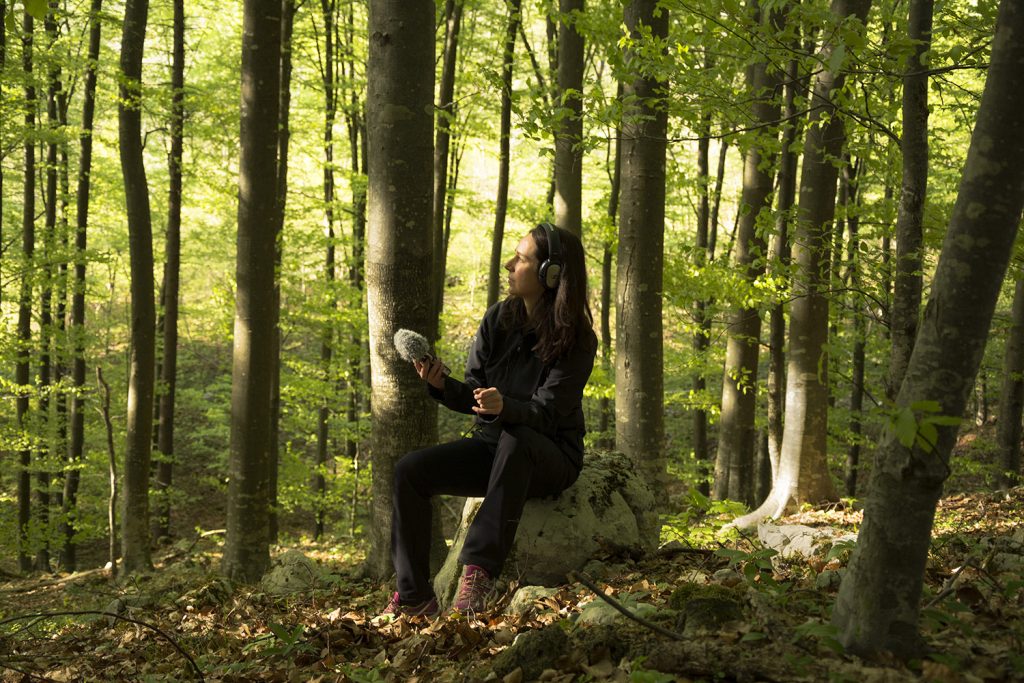
Did original intention in releasing Biodukt change in response to the coronavirus crisis?
Martina:In the 20th century an important philosophical branch developed: environmental philosophy, which calls attention to how the entire Western civilisation is on a fundamentally flawed path, going against the flow of the planet. It endeavours to understand itself in a deeper way, no only limiting itself to studying the concrete consequences of environmental pollution and destruction. Many Western philosophers have stated that there is something wrong with the Western way of thinking. The belief in a more united, healthy means of coexistence is not a new one, it probably goes back the time of industrialisation. As Hegel wrote: “When man alters nature, he himself is altered”. The album offers contemplations about nature, and although the recordings may seem simple at first, they hide within them the powerful psychological function of sound in these times of coronavirus crisis.
Have you received feedback from listeners about Biodukt? If so, what are they saying?
Simon: Responses to the album have been pretty positive, for example »the best sort of nature album», »the perfect soundtrack in corona-times«, »such a great gift album«, »beautiful, pristine recording«, »ho un bosco dentro casa e mille uccelli cantano«, »die perfekte Soundkulisse für einen öden Tag zu Hause in Corona-Quarantäne«, »soundtrack pour déjouer le confinement en milieu urbain«, and so on. Some also ordered several copies, for presents, for family and friends. We are glad to see such a response from listeners, radio stations as WFMU, CITR and publications such as “A Closer Listen”. Some recordings from the album have already been presented on various compilations: Cities and Memory, Sonospace, Forests of the World…
In your opinion, why are nature sounds so soothing to people in times of crisis?
Martina: The sound of nature is a sound archetype of humankind. Despite many forgetting about it due to the extensive presence of technology, it still exists. It awaits, somewhere in the depths, to be pulled out and dusted off. It is a “true” story that must be told. Clarissa Pinkola Estés, when writing about the archetype, says that it is that unexplainable place from which stems the body’s immune system, as well as all the mystical and archetypal figures and desires, including our hunger for God, with a desire for mysteries, as well as holy and secular instincts. She says that the archetype exists everywhere, although not being visible in its usual meaning. What can be seen in the dark is not always visible in the light.
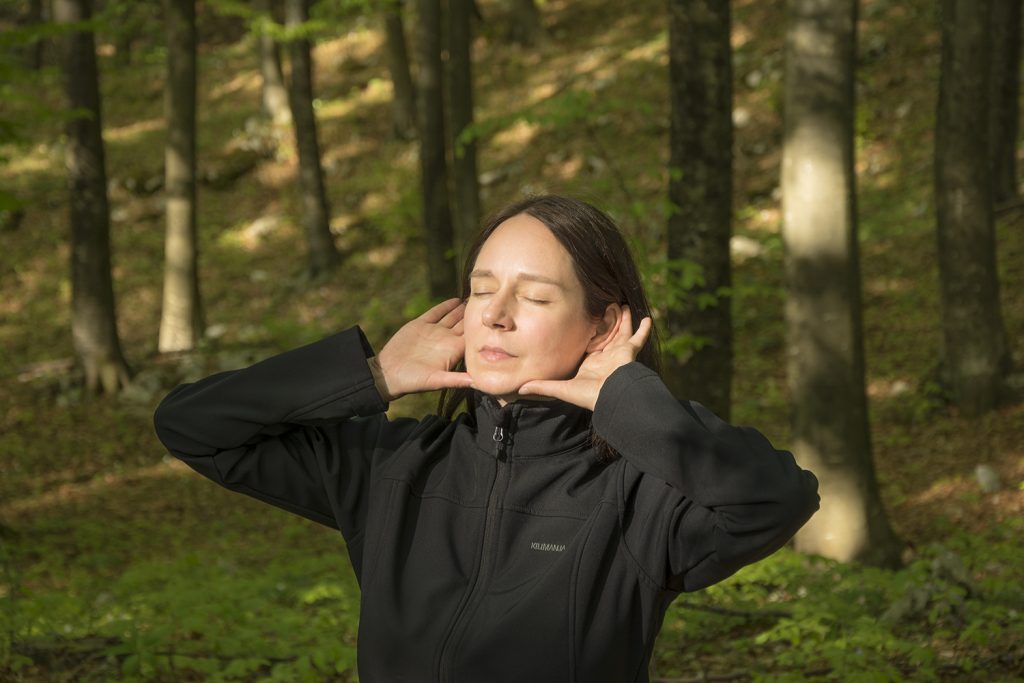
Do you think field recordings are an adequate substitute for going outside?
Simon: Field recordings cannot replace going out into nature. It cannot replace breathing in the fresh air and the majestic views, it cannot feed the eyes with the bright shades of green. Being outside positively impacts the mind, body and soul. But if you do not have the possibility to go out, if you are in lockdown and forced to stay inside your home, then these recordings can be a good substitute and exciting listening experience. In recent years, it was discovered that the sounds of nature have a particularly deep impact on people. Regardless whether it is the sounds of birds chirping or a stream burbling, it is proven that nature’s sounds have a positive effect on the processes within a person’s brain, making us feel pleasant and calm. This is another reason why we decided to offer the digital version of the album as a free download. It is our small contribution to humankind to make it easier to overcome the current crisis.
Martina: As a special touch, we added a drop of pine tree essential oil to each CD cover for people to enjoy. Unfortunately, due to noise pollution and daily routines, we do not pay attention to the sounds of nature, we take them for granted. The album awakens a sense of connection to nature within the listener and, on the basis of an intense experiential situation, stimulates a different way of perceiving sound. We recommend that you listen Biodukt in two different ways. As an audio backdrop, as a quiet soundtrack to your everyday tasks, or in complete attention, where you close your eyes and actually experience the symphony of nature, the great composer
***
Harley Oliver Brown is a writer, journalist, radio producer and host living in Brooklyn, New York. Her work has appeared in the Guardian, FADER, NPR, Pitchfork, and New York Magazine, among other publications.

